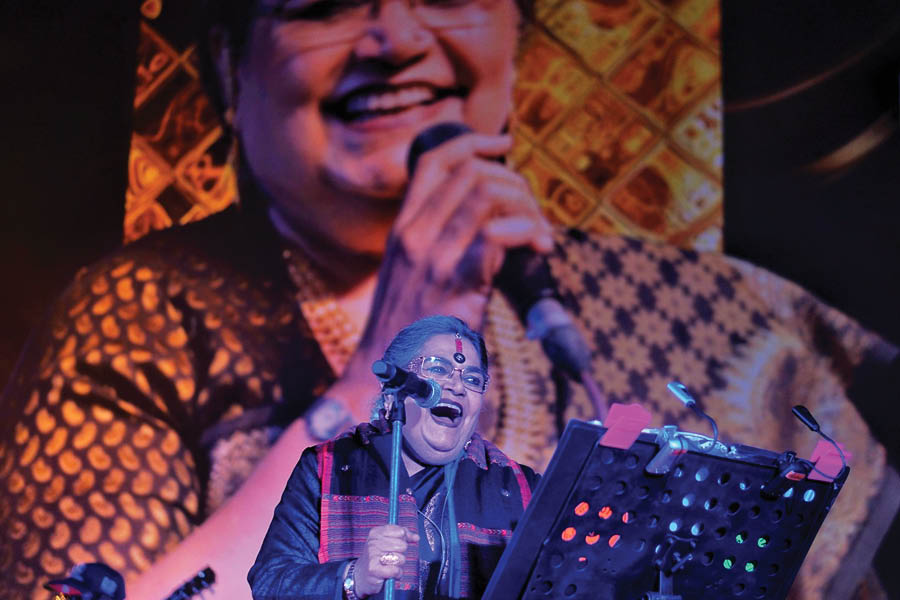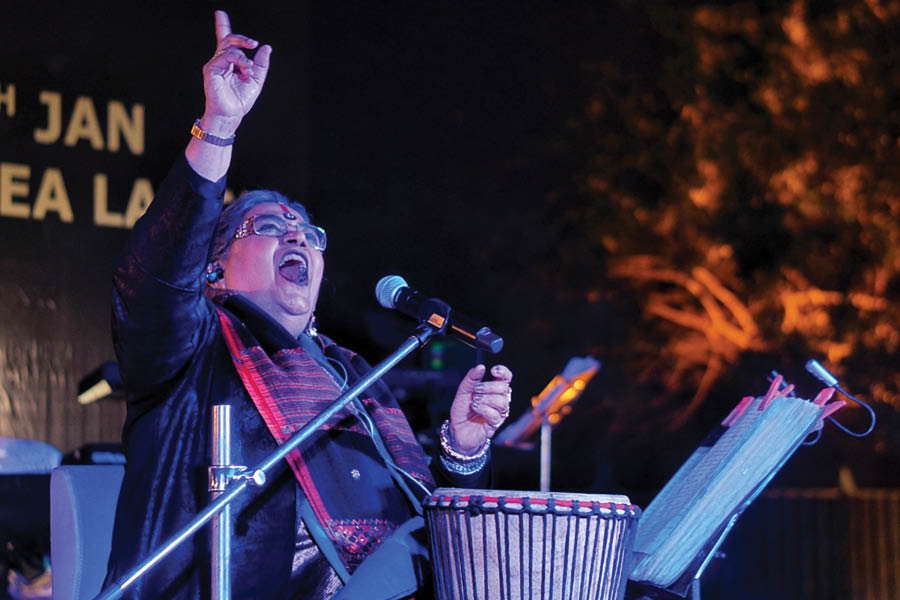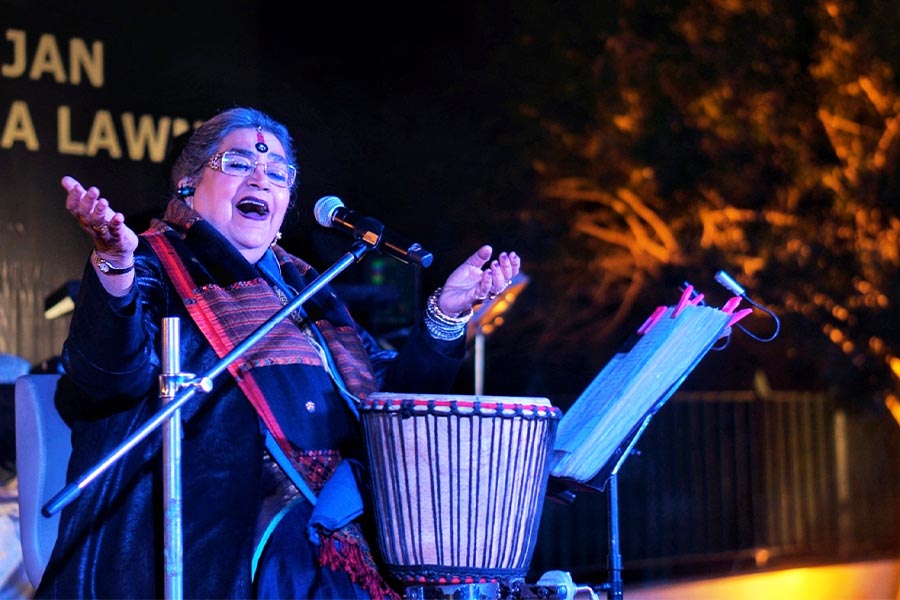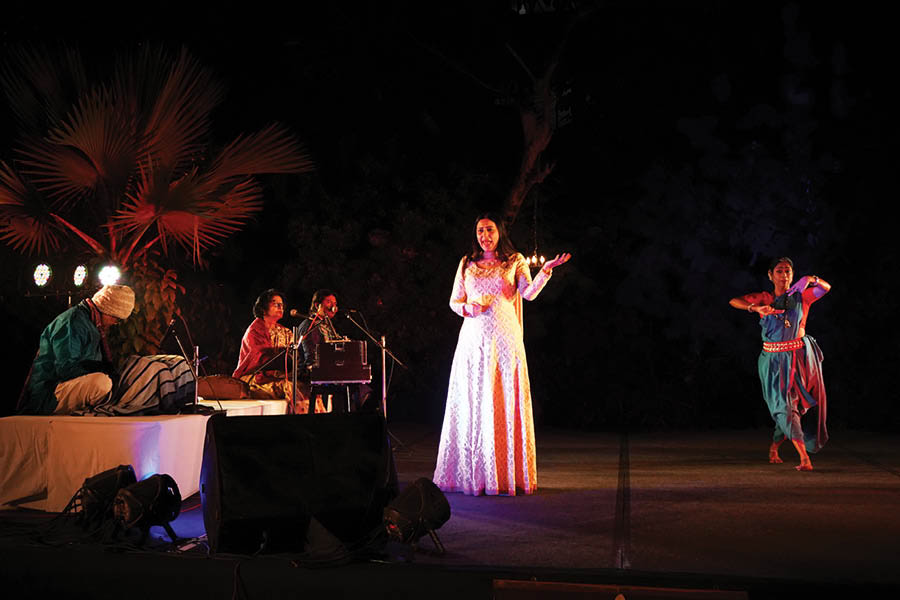The voice that has mesmerised audiences of all ages across the world for more than five decades remains as vibrant as ever. Kolkata’s very own Usha Uthup was recently honoured with Padma Bhushan for her incredible contribution to music. Having started her career as a nightclub singer in Kolkata in 1969, she went on to perform across India and around the world, exploring various music styles. However, nothing has changed for this 76-year-old singer, who remains the same girl next door in her trademark Kanjeevaram sari and flowers in her hair. The only change we see is her updated playlist at concerts, where she effortlessly covers songs from the 1970s to the latest hits.
My Kolkata spoke to Usha Uthup before her show at the Royal Calcutta Golf Club on January 28, where she shared her emotions post her achievement and more.
Congratulations on winning the Padma Bhushan this year. Tell us about your immediate reaction to the news.
I got the news on January 25 and, honestly, I couldn’t believe it. I asked the gentleman from the ministry, “Is this true or is it a joke?” His response was reassuring, confirming it was true. However, they wouldn’t disclose anything until it was formally announced. Initially, it felt surreal, but then I felt a bit nervous, too. We were in the car, having just wrapped up a show at Symbiosis International University, Pune, when the news came in. So, I had to contain my excitement.
So, when did it finally sink in?
I said my prayers and thanked God. Thanks to my family, my musicians, technicians and my audience, who have supported me for 54 years. When I reached home, I didn’t know how to keep a secret like that. So I rang up the gentleman and asked if I could at least tell my family. And then I shared the news with my daughter, my son and my husband.
How did they react to the news?
My husband simply said, “Well done” but my children were over the moon. In about an hour, the news was out on television. After that, phone calls kept me awake all night. It was one of the most exciting moments of my life! When your country appreciates your work and so does the government… it’s a whole different feeling.
This wouldn’t be the first time you made your city or the country proud…
It’s because I approach my work with a certain responsibility. I don’t just convey messages. I sing to make people happy, to put a smile on their faces and create a space where people can listen to music without any barriers — caste, creed, colour, language, gender, age, sex… no barrier at all. And all these things that I’ve believed in reflect in my song. I’ve always said it’s not about being a good singer or a bad singer, but about being 100% original. I consider it an advantage that we are born in a country like India.
Could you please elaborate on that?
In India, we have about 17 primary languages and thousands of dialects. Additionally, I’ve had the privilege of singing in eight foreign languages. It’s truly gratifying when the country recognises your efforts and understands your motive. My sole purpose in life is to bring joy to people through my music.

The 'Queen of Pop' performed at RCGC on Jan 28 Soumyajt Dey
You have been packing venues for more than five decades. How have you sustained that?
To remain relevant, one has to move along with time. That’s why I find myself being interviewed by newer generations like yours, and the ones before as well. I’ve been singing for five decades, and it’s been an amazing journey. I’ve always said that the song itself is much larger than the singer.
Fifty-four years is a long journey. Do you ever find yourself reminiscing about a particular moment or wishing to change something?
I keep reinventing myself all the time, because if you don’t reinvent yourself or revisit the songs or the lyrics that you’re conveying, then staying relevant becomes challenging. So I’m living in the moment all the time. I use the past only as a yardstick for learning from my mistakes… but I have absolutely no regrets. I don’t regret anything. People have asked me whether I regret that I never learnt music and the truth is I don’t know a note of music.
What has been your response to that?
Why does learning music mean so much to me, beyond just seeking recognition from the country? See, if I were a classical singer or a musician, it would be natural to receive awards at some point. However, my journey began as a nightclub singer. I did concerts all over India and abroad and did Bollywood, rock, pop and more. So, it just boils down to the fact that I’m a people’s singer. Getting this award will also inspire the younger generation and will reassure them that if I can achieve it, so can they.
What message would you like to convey to the current generation of musicians?
To be honest, figure out what you want in life and prioritise. Because there is absolutely no substitute for hard work and honesty.
If there is a general misconception that you have broken by just doing what you do and love, what do you think that misconception would be?
I believe it’s about the way I looked or presented myself. People often expect that someone in a sari would perform classical music or Indian-based ragas, maybe even dance. This perception existed when I started off in 1969. That was a misconception. I’d sing a song like Fever or The Windmills Of Your Mind wearing a sari. They would have never expected that from a sari-clad girl next door, who wore flats and had flowers in her hair.
Back then it must have been challenging…
I looked at everything as a challenge and I knew my weakness, too. The point is to recognise your limitations and it’s only when you know your weakness that you make it your strength. The fact that the kind of voice that I have and the clothes that I wear, singing a song like Get Lucky or Flowers… anyone would have expected somebody beautiful, with a great figure… But there I am in a sari. And it shows that it doesn’t matter and people will love you just the way you are.
Trincas is where it all began and currently, there are a lot of young musicians in that area. What is your take on their talent?
The sky’s the limit for them. Many of the singers these days are all trained — whether they sing Hindi music or western. There are places where you can go and get your vocal training. Our youngsters have so much to build upon because they’ve got technology.
How did you approach your music back then?
When I started singing, getting the lyrics of some songs was a huge task. I had to wait for them to play on the radio and then listen a 100 times to get the words right. Also, if it was in another language, I had to rely on just the phonetics. Suppose I sang a Hindi or Marathi song, what sounded correct to me might have been entirely wrong. And now when you see the kids, they say, “Oh yeah bro, we’ll give you the lyrics. Yo!”, and they just have to get it off the net. There’s no stress for anything. But never underestimate your audience.
2024 has taken off on a great note this year. What else can we expect from you?
We are currently working on an exciting project, something we’ve explored in the past. When I initially started singing at restaurants like Trincas, I performed songs like Bésame Mucho, which is in Spanish. After some time, I realised there was a Hindi song that sounded quite similar. So, by saying, Bésame, bésame mucho, I could pair it with Yeh sama, sama hai pyar ka. My goal is to blend English, Italian, Spanish and Hindi songs, adapting them into one another. We plan to release around 12 songs or it might even go up to 25.


